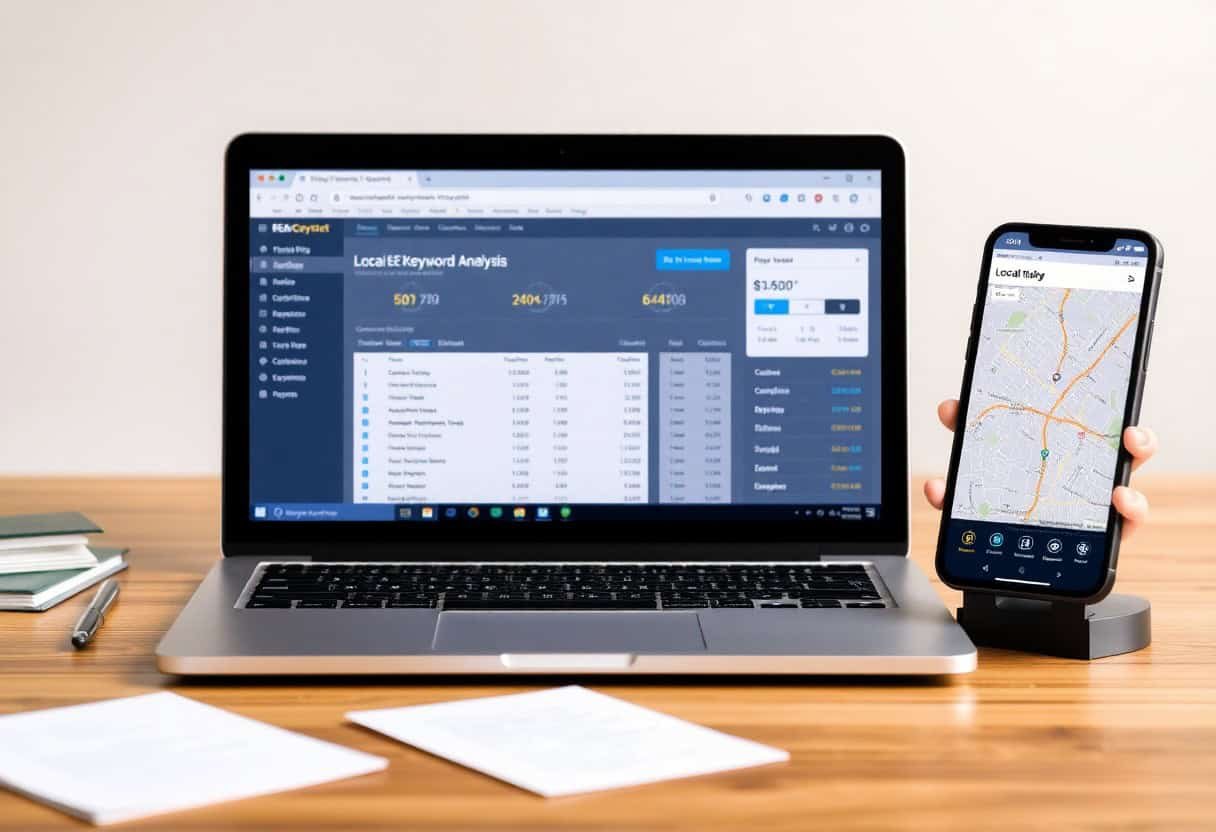There’s a strategic process to identifying the right keywords for local SEO that can significantly enhance your online visibility. You need to focus on terms that reflect your specific services or products combined with local qualifiers such as your city or neighborhood. This post will guide you through effective methods to discover and select these keywords, helping you attract more relevant traffic to your website and connect with local customers effectively.

Key Takeaways:
- Focus on location-specific keywords that include city, neighborhood, or region names.
- Incorporate relevant local terms and phrases that potential customers might use in searches.
- Utilize tools like Google Keyword Planner to identify search volume and competition for local keywords.
The Significance of Local Keywords in Search Rankings
Local keywords play a vital role in determining your business’s visibility in search results. Utilizing specific geographical terms can enhance your chances of appearing in the coveted local pack, which results in higher click-through rates. Adopting keywords that reflect your service area, such as city or neighborhood names, allows search engines to better understand your locality. This approach not only targets potential customers nearby but also distinguishes you from competitors, reinforcing your relevance in local searches.
The Connection Between Local Intent and Consumer Behavior
Consumers increasingly seek products and services that meet their immediate needs, often searching for local options via mobile devices. These localized queries indicate a strong intent to purchase, with research showing that 76% of people who search for something nearby visit a related business within a day. Understanding this behavior allows you to craft content that aligns with their intentions, increasing the likelihood of conversions.
How Local Keywords Impact Your Website’s Visibility
Targeting local keywords boosts your website’s visibility by aligning it with user search intent. By optimizing your content around these terms, you increase the chances of appearing in local search results and Google Maps listings. For example, a bakery in Los Angeles can use keywords such as “best cupcakes in Los Angeles” to attract users specifically looking for that offering in their location. This kind of focused strategy enhances both organic rankings and local relevance.
Local keywords strengthen your website’s visibility by significantly improving its ranking on search engines. The integration of these keywords into your content, meta descriptions, and headings draws attention to your business’s location and offerings. Data indicates that 46% of all Google searches are seeking local information, so consistently using localized terms can significantly increase organic traffic. This strategy also fosters trust and credibility among potential customers, as they find relevant information tailored to their specific area, leading to higher engagement and conversion rates.
Crafting a Local Keyword Strategy That Works
Creating an effective local keyword strategy requires understanding your audience and their search behaviors. Focus on keywords specific to your area and industry to enhance your online visibility. Analyze competitor strategies, align your content with local trends, and ensure your website addresses the unique needs of your community. This targeted approach not only drives more relevant traffic but also fosters stronger connections with potential customers.
Conducting Keyword Research for Your Local Area
Begin your keyword research by identifying terms that are relevant to your products or services combined with location-specific identifiers. Use tools like Answer the Public or Ubersuggest to discover popular searches in your area. Explore local forums and social media groups to glean insights about the language and phrases your community uses. Engaging in this research helps you capture a clear picture of the keywords that resonate with potential customers.
Utilizing Google Tools for Real-Time Insights
Leveraging Google tools can provide you with valuable, real-time insights into local search trends. Google Trends allows you to see the popularity of specific search terms over time, and Google Keyword Planner helps you discover related keywords along with their search volumes. Combining these insights with analytics from Google My Business reveals patterns in how customers are searching for services like yours, allowing for fine-tuned keyword targeting.
Using Google Trends, you can analyze the search interest in specific keywords over time and across different locations, helping you spot seasonal variations or emerging local interests. Google Keyword Planner not only shows average monthly searches but also suggests additional keywords tailored to your business, enhancing your reach. Furthermore, Google My Business highlights the queries that lead users to your listing, revealing insights into what matters most to your audience, enabling you to adjust your keyword strategy accordingly.
The Power of Long-Tail Keywords in Local SEO
Long-tail keywords play a significant role in enhancing your local SEO strategy. These specific phrases, often comprising three or more words, attract users who are further along in the buying cycle. By targeting long-tail keywords, you can effectively capture niche markets and address the specific needs of your local audience, leading to higher conversion rates and improved rankings in search results.
Why Long-Tail Keywords Capture Targeted Traffic
Long-tail keywords deliver highly relevant traffic because they often reflect what users are specifically searching for. For instance, someone searching for “affordable vegan restaurant in downtown Austin” demonstrates intent that’s more defined than simply looking for “restaurants.” This specificity leads to visitors who are likely to engage with your content and convert, maximizing the effectiveness of your local SEO efforts.
Examples of Effective Long-Tail Keyword Strategies
Using long-tail keywords effectively requires a strategic approach. For example, consider targeting phrases like “best pet grooming services in San Diego” or “family-friendly hotels near Yosemite National Park.” Analyzing keyword performance regularly allows you to refine your strategy; tools like Google Keyword Planner or SEMrush can help pinpoint popular searches specific to your locality. Additionally, incorporating these keywords into your website’s content, metadata, and local listings strengthens your search visibility.

Analyzing Competitor Strategies for Local Keywords
To excel in local SEO, you must analyze your competitors’ strategies for local keywords. By observing who ranks well in your area, you can uncover which keywords drive traffic in your niche. This analysis not only reveals keyword opportunities but also helps you identify content gaps that you can fill. Studying competitor strategies enables you to adjust your own tactics and focus on gaining a competitive edge.
Identifying Your Primary Competitors’ Keyword Focus
Your primary competitors’ keyword focus serves as a roadmap for your own strategy. Begin by pinpointing businesses that occupy similar market spaces within your geographic area. Examine their websites and current ranking keywords, noting which terms help them stand out. By understanding their target keywords, you can create a list and find ways to differentiate or improve upon these choices in your content.
Tools for Evaluating Competitor Keyword Performance
Several tools can help you evaluate your competitors’ keyword performance effectively. Platforms like SEMrush, Ahrefs, and Moz allow you to analyze traffic data, keyword rankings, and backlink profiles for competitor domains. These insights reveal which keywords generate traffic and conversions, guiding your strategic decisions. In addition to these tools, Google Keyword Planner provides valuable keyword volume and insights based on demographics and location.
Using tools like SEMrush or Ahrefs, you can access detailed reports that illustrate your competitors’ top-performing keywords and their respective traffic volumes. For example, if a competitor ranks for “local bakery near me” and attracts thousands of visitors, you can gauge its effectiveness and consider optimizing your content for similar or related terms. Tracking keyword performance metrics, such as click-through rates and search volumes over time, allows you to refine your approach continually and stay ahead in local search visibility.
Implementing Keywords Across Various Online Platforms
Integrating local keywords across different online platforms maximizes visibility and connects you with your community. By ensuring consistency in your messaging and keyword usage, you align your brand with user searches, boosting local relevance. Your website, social media profiles, and review platforms all contribute to your local SEO strategy when optimized effectively.
Optimizing Website Content with Local Keywords
Incorporate local keywords naturally within your website content, focusing on key areas such as headers, meta descriptions, and image alt text. Highlight your location, specific services, and customer demographics, ensuring the information reflects local relevance. For example, a bakery in Austin might use phrases like “best cupcakes in Austin” to target potential customers effectively.
Extending Local Keywords to Social Media and Reviews
Using local keywords in your social media posts and customer reviews enhances your overall visibility. Tailor your content to reflect local events, trends, or collaborations, and encourage customers to mention your location when sharing their experiences. This not only strengthens your local presence but also engages your audience more deeply.
Extending local keywords to social media and reviews involves actively encouraging conversations around your services while incorporating relevant location-based terms. Engage with your audience by participating in local discussions, sharing community events, and asking satisfied customers to leave reviews that highlight their experience with your business. Utilizing hashtags that reflect your locality and prompting users to include localized terms can significantly enhance your reach, helping you attract local clients and fostering a sense of community around your brand.
Conclusion
The keywords you target for local SEO should be specific to your business and location. Focus on long-tail keywords that include your city or region, as well as terms that are relevant to your services or products. Incorporate local landmarks, neighborhoods, or community-based phrases to enhance your visibility. Utilizing tools like Google Keyword Planner can help identify high-traffic keywords in your area. By effectively optimizing your content around these selected keywords, you can improve your local search rankings and attract more customers to your business.
FAQ
Q: What are local keywords?
A: Local keywords are specific phrases that include geographic terms and are used to attract customers from a particular area. These can include city names, neighborhoods, or phrases like “near me” that locals might use to find products or services nearby.
Q: How do I find the right local keywords for my business?
A: You can find the right local keywords by using tools like Google Keyword Planner, analyzing competitor websites, and considering what terms your target audience might search for. Additionally, you can utilize location-specific modifiers in your search queries.
Q: Should I include long-tail keywords in my local SEO strategy?
A: Yes, incorporating long-tail keywords is beneficial for local SEO as they are often less competitive and can attract more targeted traffic. These keywords typically consist of three or more words, including specific services and area names, which help to match user intent more precisely.

